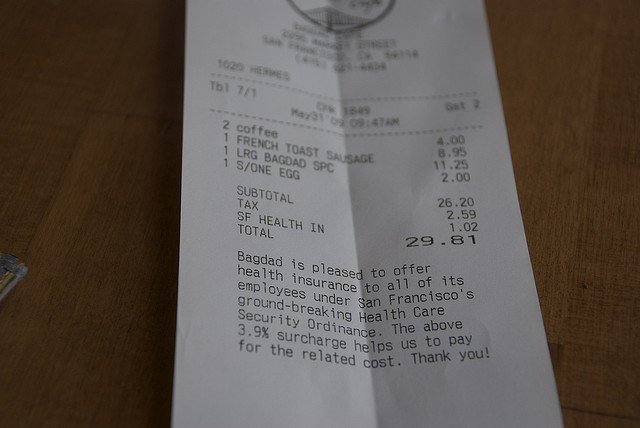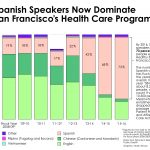UPDATED 6:53 p.m. with response from the mayor.
San Francisco’s civil grand jury on Thursday chastised many of the city’s restaurants for profiting from surcharges they add to customers’ bills under the name of paying for health care and recommended that the city ban the practice.
In its report the civil grand jury recommended that restaurants no longer be allowed to add health care surcharges or be allowed to offer health reimbursement accounts as a way to comply with a city law requiring businesses to help workers with health care expenses. The San Francisco Public Press reported on this problem last November as part of a team report on the city’s universal care program, Healthy San Francisco.
In a summary of its investigation into compliance with the Health Care Security Ordinance, the civil grand jury said most of the restaurants adding surcharges made money off those charges. The ordinance requires most San Francisco businesses and nonprofit employers to spend some money on health coverage for employees.
“The Jury found that a growing segment of restaurant establishments are profiting from the practice of adding a surcharge to the bill of every customer,” the report said. “These same employers are legally able to reclaim funds intended for employee health care thus increasing their profits even more. This blatant capture of funds is at the expense of their employees, and their customers who believe they are paying surcharges for healthcare.”
The civil grand jury directly looked at a small number of restaurants. Of 18 restaurants adding surcharges to customers’ bills, 16 profited, said the chairman of the committee that looked into the issue. He said their average profit on the surcharges was 46 percent. The two that didn’t profit offered standard health insurance instead of health reimbursement accounts, said the committee chair, Mark Busse.
“On HRAs, the jury concluded that the system is broken when less than 10% of the HRA funds make it to the employees,” Busse said.
“The jury calls for the end of this gratuitous practice of allowing business owners to add surcharges to recover the cost of employer mandates,” the group stated in releasing its report. “Additionally, the jury recommends the elimination of employer Health Reimbursement Accounts (HRAs) in favor of the city option since the city cannot effectively police the rampant abuse of HRAs.”
The Health Care Security Ordinance took effect in 2008 and requires that every business with 20 or more employees and every nonprofit employer with 50 or more employees contribute to financing health care for those who work at least eight hours a week. The ordinance allows them to choose from three methods to comply. One is to offer standard health insurance. A second is to enroll their employees in Healthy San Francisco, the city’s health plan for the uninsured. A third is to offer health reimbursement accounts that employees can draw from to pay for medical expenses. A number of employers with mostly part-time staff, such as restaurants and retail shops, chose this option.
If employees don’t get sick or don’t draw from health reimbursement accounts, the law has allowed employers to recoup unspent funds in those accounts.
The city’s Labor Standards Enforcement Office started getting complaints about the reimbursement accounts and last year. It studied employer compliance with the ordinance over the last three years and found that four-fifths of those using health reimbursement accounts were recouping funds.
Supervisor David Campos proposed an amendment to the Health Care Security Ordinance last year to disallow businesses to recoup unspent money. The measure passed, but Mayor Ed Lee vetoed it. Early this year, supervisors passed a compromise amendment that requires businesses using the reimbursement accounts to keep money in those accounts for two years before recouping unspent health funds.
The mayor and various city agencies will be required to respond to the civil grand jury report in coming months.
On Thursday, Donna Levitt, manager of the Office of Labor Standards Enforcement, said, “The civil grand jury tackled a complex issue and raised some serious concerns.” Levitt said her office planned to issue a report next week analyzing data submitted by employers about their 2011 compliance with the Health Care Security Ordinance.
“Mayor Lee will review the Civil Grand Jury report that is sitting on his desk when he returns from the US Conference of Mayors Leadership meeting in Philadelphia,” said Francis Tsang, a spokesman for Lee. “The mayor has already taken steps through legislation to change some aspects of the Health Care Security Ordinance and will continue to examine strengthening workers access to health services.”
Read the complete report from the civil grand jury here.










